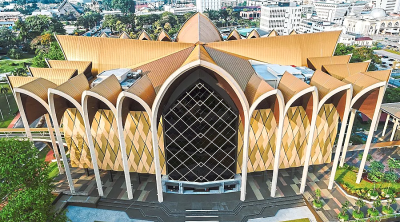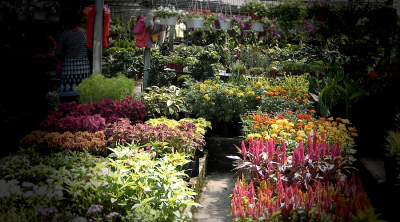
Headquartered in Madrid, the UN Tourism is leading the citizens of the Global Village towards a “responsible, sustainable and universally accessible tourism”.
At first sight, the UN body seems to remind the world to safeguard our planet while travelling, so that we can leave behind a healthy planet where our children and grandchildren can continue to dwell safely.
By the way, is the human habitat being intimidated now? And what has this got to do with tourism?
Put it very bluntly, humanity has accelerated the environmental degradation of our planet due to overdevelopment, industrialisation, militarisation, urbanisation and congestion, to satisfy human needs.
In 2018, I took a group of Malaysian tourists cruising within the world’s biggest and most verdant tropical rainforest in Amazon Basin. Back then our eco-guide told us proudly: We have abundant rainfall, and the flora and fauna are growing happily here!
His words still lingering in my ears, several years later it is now reported that the Amazon Basin in Brazil is experiencing severe drought and the subsequent famine; many native animals and plants are suffering, and the indigenous people there too!
Are you serious? Is global warming really getting so merciless that even the biggest “green lung of the Earth” is not spared from its disastrous consequences?
In 2020, during my fourth expedition to Antarctica, we learned that an ice sheet the size of London was breaking off and rapidly melting. And when I made the same trip again in 2023, an ice shelf the size of the whole of Britain was found breaking off and slowly drifting towards the Atlantic, melting.
Local indigenous residents, along with the penguins, were forced to move further south towards the interiors, as their major food, the krills, were facing extinction as a result of warmer sea temperature.
As a matter of fact, the Arctic is not any better; the polar bears are facing a massive starvation crisis due to continued shrinking of the ice sea. Sharing the similar doomed fate are the Maldivian islands that could be completely submerged as the sea water level rises.
As if that is not enough, the major earthquakes that have struck different parts of our world this year are absolutely terrifying, not to mention the super typhoons in Northeast Asia in September and October, ravaging the coastal areas at the horrendous speed of 265 kilometres per hour.
In the meantime, Florida in the United States is suffering from Hurricane Milton and tornadoes of unprecedented scales, followed by massive rainfall and floods. Residential houses, roads and infrastructure were all badly damaged, along with crops and livestock. As a result, the local residents are suffering immeasurable losses!
Natural disasters and hostile weather have been ravaging planet Earth successively. Many of the natural disasters are, honestly, human-induced, and our planet is very ill right at this moment!
Even though it is well aware that its powers are limited, UN Tourism is still trying to encourage people to care about the Earth — our one and only inhabitable planet.
Every year, some 1.5 billion people around the world are travelling around to experience new cultures. During such movements of people, we should realise which areas require our urgent action to ensure their continued existence.
Most importantly, we can work together to create a greener tourist environment, such as refusing excessive carbon consumption during our trips, not to waste food, rejecting disposable toothbrushes provided by the hotels, and saying “no” to single-use chopsticks, among others.
To put it crudely, adopt a simpler and greener lifestyle in creating a sustainable environment. Although such actions can be at times minor and insignificant, each of us has this inevasible obligation!
Unfortunately, humanity has never picked up a lesson from the Second World War, nor treasured our hard-earned peace. Cross bombings are happening every minute in the Middle East right now, numbering tens of thousands each day. Not only are innocent civilians exterminated, historical landmarks, world heritage sites and agricultural crops are all wiped out.
Flames from the war are damaging our atmosphere, disrupting food chains, triggering famine and diseases, turning millions into refugees, causing oil prices to skyrocket and the ensuing inflation.
The weird thing is, the world is still allowing the Americans to dictate our fates. Are we going to let Kamala Harris or Donald Trump control the common destiny of humanity?
Simply put, human disasters can have the flip side, but innocent ordinary citizens have to helplessly swallow the consequences of intense competition between the superpowers!
Every year, the UNESCO will recommend world cultural (natural) heritage sites from all across the world in hope of reminding the people to protect the historical legacies of humanity over the millennia. The move has also prompted people to want to visit these sites and learn from them.
That’s why I say that tourism can help us improve ourselves, and as a major sector that promotes the global economy, tourism also encourages intercultural exchanges, innovation and sustainable development.
While much of the world now appears to be in harmony, there is actually this undercurrent of turbulence lurking somewhere, while our environment is experiencing severe deterioration.
The tourism industry can play a pivotal role in minimising the negative impact on our environment while positively shaping our society and whipping up good governance, in the end materialising more sustainable and morally responsible tourism.
Anyway, I feel that UN Tourism’s “responsible, sustainable and universally accessible tourism” philosophy will indeed prompt the industry operators to reconsider enhancing their ESG (environmental, social, and governance) strategy coverage.
In tourism, ESG practices are effective solutions to boost sustainable development, catch the attention of consumers, and ensure the sustainability of their businesses. Only in this way can our planet Earth be protected, and the future of our posterity assured.
Let’s come together to explore the true meanings of travelling!
(Lee San is Founder and Group Executive Chairman of Apple Vacations. He has traveled to 132 countries, six continents, and enjoys sharing his travel stories and insights. He has also authored five books.)
ADVERTISEMENT
ADVERTISEMENT








































